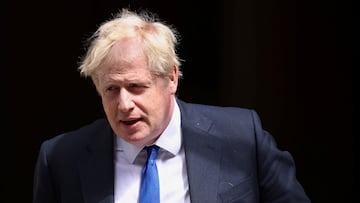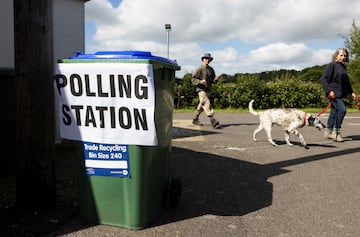LATEST NEWS
How many prime ministers has the UK had, how long does a term last and who has been in office the longest?
As the UK heads to the polling stations, we look back at the men and women who have occupied 10 Downing Street over the years.

Millions of voters in the United Kingdom have cast their votes in today’s general election at some of the 40,000 polling stations that are open until 10 p.m. local time this evening. Many of the pre-election polls indicate a Labour victory, bringing to an end 14 years of the Conservatives in power. If that happens, then Kier Starmer will become the UK’s 17th prime minister during the post-war era.
Ten of those first took office between elections, five continued in office following a general election whilst they were serving as prime minister and one was voted into power for a second time after a period in opposition (Winston Churchill: 26 October 1951-5 April 1955).

You might also enjoy
Who was the first prime minister of the UK?
A total of 57 people (54 men and three women) have served as prime minister of the UK. The first was Sir Robert Walpole taking office on 3 April 1721. He was also longest holder of this office, serving just short of 21 years. Liz Truss has the honor of being the shortest-serving - her tenure lasted just seven weeks.
A total of eight prime ministers have been in office for less than one year - Andrew Bonar Law was obliged to resign through terminal illness in May 1923 while George Canning’s tenure came to an ended when he died from tuberculosis on 8 August 1827.
UK prime ministers during the 20th and 21st Century
- Rishi Sunak (25 October 2022-)
- Liz Truss (6 September 2022-25 October 2022)
- Boris Johnson (24 July 2019-6 September 2022)
- Theresa May (13 July 2016-24 July 2019)
- David Cameron (11 May 2010-13 July 2016)
- Gordon Brown (27 June 2007-11 May 2010)
- Tony Blair (2 May 1997-27 June 2007)
- John Major (28 November 1990-2 May 1997)
- Margaret Thatcher (4 May 1979-28 November 1990)
- James Callaghan (5 April-4 May 1979)
- Harold Wilson (4 March 1974-5 April 1976)
- Edward Heath (19 June 1970-4 March 1974)
- Harold Wilson (16 October 1964-19 June 1970)
- Alec Douglas-Home (18 October 1963-16 October 1964)
- Harold Macmillan (10 January 1957-18 October 1963)
- Anthony Eden (6 April 1955-9 January 1957)
- Winston Churchill (26 October 1951-5 April 1955)
- Clement Attlee (26 July 1945-26 October 1951)
- Winston Churchill (10 May 1940-26 July 1945)
- Neville Chamberlain (28 May 1937-10 May 1940)
- Stanley Baldwin (7 June 1935-28 May 1937)
- Ramsay MacDonald (5 June 1929-7 June 1935)
- Stanley Baldwin (4 November 1924-4 June 1929)
- Ramsay MacDonald (22 January 1924-4 November 1924)
- Stanley Baldwin (23 May 1923-22 January 1924)
- Bonar Law (23 October 1922-20 May 1923)
- David Lloyd George (6 December 1916-19 October 1922)
- H. H. Asquith (8 April 1908-5 December 1916)
- Henry Campbell-Bannerman (5 December 1905-3 April 1908)
- Arthur Balfour (12 July 1902-4 December 1905)
- Robert Gascoyne-Cecil (25 June 1895-11 July 1902)
How long does a UK parliamentary term last?
In the UK, the maximum term length that a parliament is allowed to serve is five years, starting from the day on which the parliament first met. This rule to limit the duration of parliament was established by the Parliamentary Act 1911, reducing the maximum Parliamentary term length to five years.
Walpole is the longest-serving UK prime minister with 20 years, 314 days in office. He is followed by William Pitt the Younger, who held the position for 18 years and 343 days then Robert Banks Jenkinson, The 2nd Earl of Liverpool, who occupied No.10 for 14 years and 305 days. In total, 25 politicians have remained in power for longer than the mandatory five years - William Gladstone served over four terms of office spread over four non-consecutive terms between 1868 and 1892.
In the modern era, the two longest-serving prime ministers were from different parties: Margaret Thatcher (Conservative) was voted in on 4 May 1979 and remained in residence in Downing Street for 11 years and 208 days, until her tearful farewell on 28 November 1990 - a victim of the hugely unpopular poll tax. Tony Blair was in office for a similar period of time - 10 years and 56 days and remains the only politician to have lead the Labour party to three consecutive general election victories.





